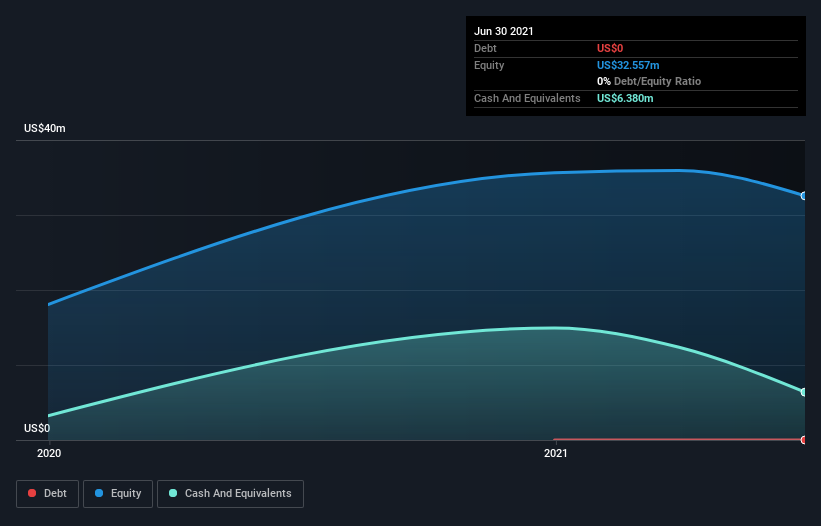We're Interested To See How Zevia PBC (NYSE:ZVIA) Uses Its Cash Hoard To Grow
Even when a business is losing money, it's possible for shareholders to make money if they buy a good business at the right price. For example, although Amazon.com made losses for many years after listing, if you had bought and held the shares since 1999, you would have made a fortune. But the harsh reality is that very many loss making companies burn through all their cash and go bankrupt.
Given this risk, we thought we'd take a look at whether Zevia PBC (NYSE:ZVIA) shareholders should be worried about its cash burn. In this article, we define cash burn as its annual (negative) free cash flow, which is the amount of money a company spends each year to fund its growth. First, we'll determine its cash runway by comparing its cash burn with its cash reserves.
See our latest analysis for Zevia PBC
When Might Zevia PBC Run Out Of Money?
A cash runway is defined as the length of time it would take a company to run out of money if it kept spending at its current rate of cash burn. In June 2021, Zevia PBC had US$6.4m in cash, and was debt-free. In the last year, its cash burn was US$2.9m. That means it had a cash runway of about 2.2 years as of June 2021. Notably, analysts forecast that Zevia PBC will break even (at a free cash flow level) in about 3 years. That means unless the company reduces its cash burn quickly, it may well look to raise more cash. The image below shows how its cash balance has been changing over the last few years.
How Well Is Zevia PBC Growing?
Happily, Zevia PBC is travelling in the right direction when it comes to its cash burn, which is down 70% over the last year. Pleasingly, this was achieved with the help of a 46% boost to revenue. Considering these factors, we're fairly impressed by its growth trajectory. Clearly, however, the crucial factor is whether the company will grow its business going forward. For that reason, it makes a lot of sense to take a look at our analyst forecasts for the company.
How Hard Would It Be For Zevia PBC To Raise More Cash For Growth?
We are certainly impressed with the progress Zevia PBC has made over the last year, but it is also worth considering how costly it would be if it wanted to raise more cash to fund faster growth. Issuing new shares, or taking on debt, are the most common ways for a listed company to raise more money for its business. Commonly, a business will sell new shares in itself to raise cash and drive growth. By looking at a company's cash burn relative to its market capitalisation, we gain insight on how much shareholders would be diluted if the company needed to raise enough cash to cover another year's cash burn.
Zevia PBC's cash burn of US$2.9m is about 0.4% of its US$751m market capitalisation. So it could almost certainly just borrow a little to fund another year's growth, or else easily raise the cash by issuing a few shares.
Is Zevia PBC's Cash Burn A Worry?
As you can probably tell by now, we're not too worried about Zevia PBC's cash burn. For example, we think its cash burn relative to its market cap suggests that the company is on a good path. But it's fair to say that its cash runway was also very reassuring. Shareholders can take heart from the fact that analysts are forecasting it will reach breakeven. After considering a range of factors in this article, we're pretty relaxed about its cash burn, since the company seems to be in a good position to continue to fund its growth. Separately, we looked at different risks affecting the company and spotted 3 warning signs for Zevia PBC (of which 1 is a bit unpleasant!) you should know about.
Of course, you might find a fantastic investment by looking elsewhere. So take a peek at this free list of companies insiders are buying, and this list of stocks growth stocks (according to analyst forecasts)
This article by Simply Wall St is general in nature. We provide commentary based on historical data and analyst forecasts only using an unbiased methodology and our articles are not intended to be financial advice. It does not constitute a recommendation to buy or sell any stock, and does not take account of your objectives, or your financial situation. We aim to bring you long-term focused analysis driven by fundamental data. Note that our analysis may not factor in the latest price-sensitive company announcements or qualitative material. Simply Wall St has no position in any stocks mentioned.
Have feedback on this article? Concerned about the content? Get in touch with us directly. Alternatively, email editorial-team (at) simplywallst.com.

 Yahoo Movies
Yahoo Movies 
